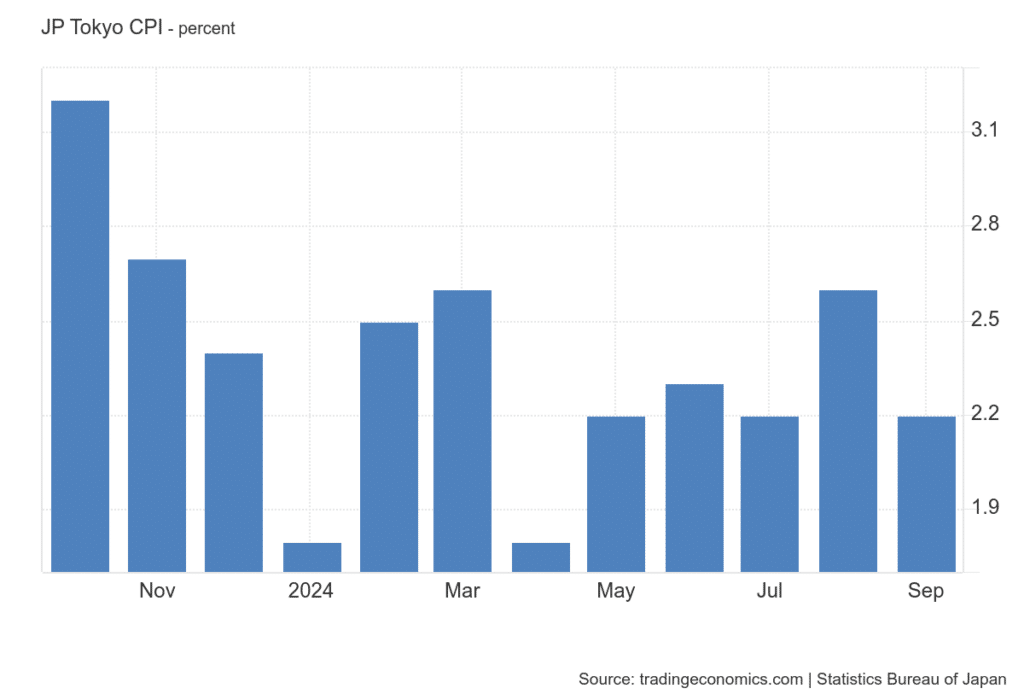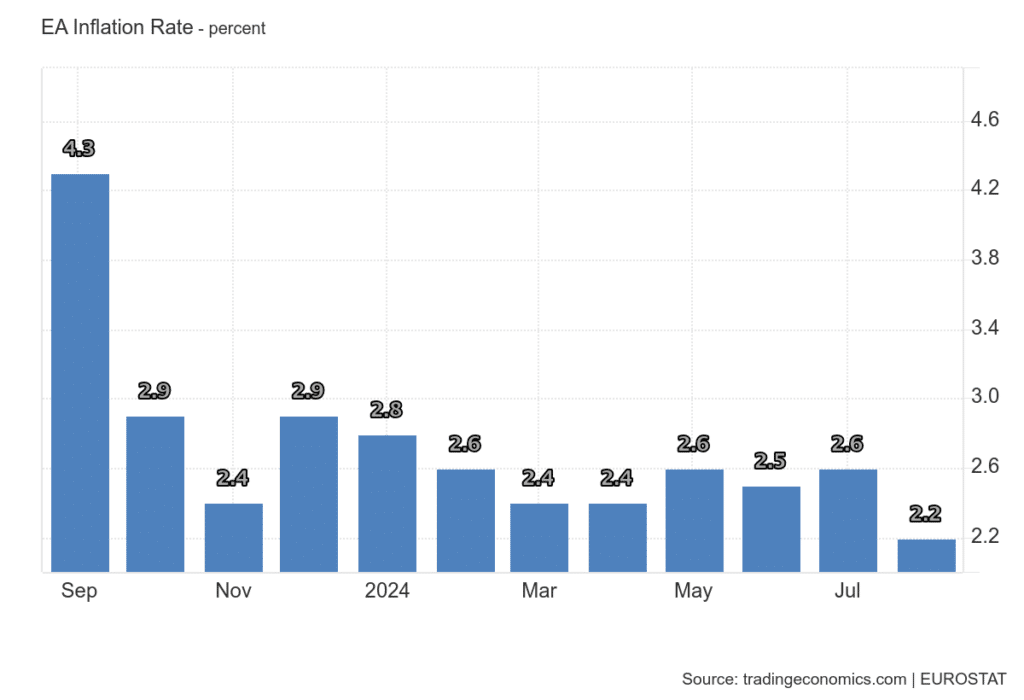Last week was nourishing from a fundamental position. Let's look back at the highlights.
At Thursday's meeting, the ECB cut rates by 25 bp. This decision is based on an updated inflation assessment, which suggests that disinflation is progressing successfully. In September, inflation in the euro area fell below the ECB's 2% target for the first time in more than three years. Although inflation is expected to rise moderately in the short term, it should fall back towards the 2% target in 2025. The European Central Bank has faced criticism for staying behind the curve and not responding sufficiently to warning signs of slowing growth and low inflation in the eurozone. Although ECB President Christine Lagarde acknowledged the risks of weak growth at a press conference, she did not suggest any steps to help improve the situation. In this case, the ECB is rather sleepwalking towards the Fed, which is already taking action, and as a result this stance could have long-term negative effects on the economy. The EUR started to weaken on this data as there is a possibility that the ECB may be forced to cut interest rates more aggressively in the future, for example by 50 basis points. The market is now pricing in this expectation, which is adding pressure to the currency.
Monday: PPI in Germany
Tuesday: -
Wednesday: meeting of the Bank of Canada
Thursday: PMI (US, Eurozone, UK, Australia, Japan), US Unemployment Claims
Friday: Tokyo inflation rate
Sources:
Last week we got a surprise from the BoE that had a strong impact on the British Pound (GBP). Let's recap together the most important news from last week.
On Thursday morning, we received some rather surprising news from the UK. The Governor of the Bank of England hinted at the possibility of more aggressive interest rate cuts than the market was expecting. He mentioned that a quick and decisive cut might be necessary to boost the UK economy in the face of a slowdown.
This was quite a turnaround given that we have been getting relatively good data from the UK recently, so the pound weakened significantly in response to this news.
Monday: Retail Sales in the Eurozone
Tuesday: unemployment rate in the Czech Republic
Wednesday: RBNZ monetary policy meeting, FOMC Meeting minutes
Thursday: PPI in Japan, Inflation in the Czech Republic, Inflation Rate in the USA and US Claims
Friday: UK GDP, German inflation rate, US PPI index, Canadian labour market
Sources:
Last week, we waited for the central bank meeting and we got unexpected events from Japan. Let's recap the highlights.
Tokyo's year-on-year consumer price index in Japan fell to 2.20 % in September 2024 from 2.60 % in August, returning to July's level and surprising markets that had expected a decline to 2.4 %. The core index rose 2 % year-on-year in September, ending four months of accelerating price growth and slowing sharply from August's 2.4 % rise, which was in line with expectations. This result is also in line with the Bank of Japan's price stability target of 2 %, supporting the central bank's cautious approach to monetary policy. This is negative news for the JPY.

Anyway, on Friday, unexpected news came from Japan, which resulted in the JPY strengthening. Shigeru Ishiba won the second round of the LDP leadership election and will become the next Japanese Prime Minister. Ishiba received 215 votes in the second round, while Takaichi received only 194 votes. This is good news for investors betting on the Japanese yen, as it was Takaichi who was the one who loudly criticized the Bank of Japan for raising interest rates too quickly. So Ishiba's victory at least partially eases that pressure.
Monday: Japanese retail sales, UK GDP, German inflation rate, US PMI
Tuesday: PMIs (US, Canada, Australia, Eurozone, Switzerland and UK), Eurozone inflation, retail sales in Australia and Switzerland
Wednesday: Eurozone labour market
Thursday: PMI (Australia, Japan, Eurozone, UK, US), inflation in Switzerland, PPI index in Eurozone, US jobless claims
Friday: US labour market data (NFP), inflation in Switzerland, PMI index in (Canada, UK, Eurozone)
Sources:
We have had another week in which central banks played a big role. Let's recall together an important event.
On Tuesday, we got inflation data from the eurozone, which was negative for the euro. The core inflation rate fell to 2.2 % year-on-year, the lowest since July 2021. Core inflation slowed slightly to 2.8 %. The data was broadly as estimated, so no surprises. The ECB announced that it will pause rate cuts in October while it assesses the expected increase in price pressures. At the moment I would take this as negative news for the euro through the downturn, but the ECB will still be on the lookout to meet its inflation target.

Monday: Eurozone, Australia, UK, US PMI
Tuesday: Japan PMI, Bank of Australia meeting
Wednesday: CNB meeting, inflation rate in Australia
Thursday: GDP and jobless claims in the US, SNB meeting
Friday: Eurozone, Japan and Canadian GDP inflation rates
Sources:
Last week we focused mostly on the ECB meeting and data from the US labour market and inflation rate. Let's take a look at them together.
The number of claims for unemployment benefits unexpectedly rose to 230 000 last Thursday. Unemployment claims unexpectedly rose to 230,000 last Thursday. The figure remained well above the average of earlier this year, reinforcing the ongoing trend of a softening labour market. This data also helped to some extent to push gold (XAU/USD) to a new all-time high.
Monday: PPI in Switzerland
Tuesday: US retail sales, Canadian inflation rate
Wednesday: UK and Eurozone inflation rates, Fed monetary policy meeting
Thursday: New Zealand GDP, Australian labour market, BoE monetary policy meeting, US jobless claims
Friday: Japanese inflation rate and BoJ meeting, UK and Canadian retail sales
Looks like a busy week. Apart from inflation and labour market data, we will mainly focus on the three central bank meetings (Fed, BoE, BoJ).
Sources:
Monday's recap is here! Together, let's recap what happened last week, and what we'll be watching for in the current week.
We got a solid batch of PMI data from the Eurozone during the week, from which we could see that the services data was mostly positive. But mostly services are benefiting from the Olympics in France, so this may not be as sustainable as it first looks.
On Friday, we got data from the labour market, which was rather negative. The number of persons employed in the euro area increased by 0.2 % in the three months to June 2024 compared to the previous quarter, confirming the preliminary estimate and matching the market's initial expectations. This growth was slightly lower than the 0.3% increase recorded in the first quarter. In annual terms, employment slowed to 0.8 % in the second quarter from 1 % in the previous period.
Monday: GDP in Japan
Tuesday: UK labour market, German inflation, Czech inflation
Wednesday: UK GDP, US inflation rate
Thursday: PPI index in Japan, Spanish inflation, US welfare claims and PPI, ECB meeting
Friday: French inflation rate
Sources:
The first September recap is here! Let's recap together what happened at the end of the month.
Thursday's U.S. jobless claims fell by 2,000 from the previous week to 231,000 for the period ending August 24, in line with expectations. This slight decline shows improvement, which marks us positive news for the USD for the first time in a while, although claims are therefore still above average.
Monday: PMI (Australia, Japan, France, Germany, Eurozone, UK), Swiss retail sales
Tuesday: GDP and inflation rate from Switzerland, US PMI
Wednesday: Australian GDP, PMI (France, Germany, Eurozone, UK), Eurozone PPI, Bank of Canada meeting
Thursday: Swiss labour market, PMI (France, Germany, UK, US), Eurozone retail sales, US jobless claims
Friday: eurozone, US and Canadian labour markets
This week, the market will focus mainly on Wednesday's BoC meeting, which is estimated to cut the key interest rate by 25 bp. Although a 50bp rate cut cannot be ruled out. Next, we will focus on the US labour market to end the week.
Monday's recap is here! Last week we got mostly inflation data and the US dollar was under fire again. Join us for a recap of the highlights.
The US Dollar was hit by some negative data last week, which weakened it again.
Thursday's jobless claims rose to 232,000, which was in line with estimates. This increase kept claims quite high above average and contributes to the softening US labor market. This supports market bets that the Fed will cut rates at every meeting until the end of the year.
At a conference in Jackson Hole on Friday, Jerome Powell announced that the time has come to adjust monetary policy as his confidence in inflation returning to the 2 % target increases. He noted that the risks to further inflation have diminished while the risks to employment have increased. Powell emphasized the Fed's commitment to maintaining a strong labor market while ensuring price stability. This approach could open up room for a possible interest rate cut. He certainly did not slam the 50bp door here. On the back of these announcements, the US dollar started to weaken significantly as it was more of a dovish rhetoric.
Monday: -
Tuesday: GDP from Germany (EUR)
Wednesday: Monthly inflation indicator in Australia (AUD)
Thursday: German inflation rate (EUR), US jobless claims and GDP (USD)
Friday: Tokyo inflation rate and retail sales (JPY), Australian retail sales (AUD), German retail sales and labour market (EUR), Eurozone preliminary inflation rate and labour market data (EUR), Canadian GDP (CAD)
Sources:
Monday's recap is here! Join us as we recap the highlights of the past week.
The annual inflation rate in the US slowed for the fourth month in a row to 2.9 % in July 2024, reaching its lowest level since March 2021, compared to 3 % in June and below the forecast of 3 %. Core inflation also fell for the fourth month in a row to 3.2 %, the lowest level since April 2021. The decline in inflation relative to previous periods is not significant and therefore the question of a 25 or 50 basis point interest rate cut is still open.
On Thursday, the US dollar strengthened in response and new jobless claims. The number of new claims surprised market expectations and fell to 227 thousand. This was the lowest number of new claims in five weeks, calling into question recent data that reflected a significant slowdown in the US labour market and giving the Federal Reserve some leeway to not ease monetary policy to an extent that would threaten to fight inflation.
Monday: -
Tuesday: inflation in Eurozone (EUR), inflation in Canada (CAD)
Wednesday.
Thursday: PMI in Australia, Japan, France, Germany, Eurozone, UK and US + US jobless claims, Jackson Hole Symposium (USD)
Friday: Retail sales in New Zealand and Canada, inflation rate in Japan (JPY), speech by Jerome Powell, Jackson Hole Symposium (USD)
The first half of the week will bring us inflation rates in Canada and the Eurozone. Starting Thursday, the Jackson Hole Symposium will also get underway with a speech by Fed President Jerome Powell. The Jackson Hole Symposium is hosted annually by the Fed.
Sources:
Monday's recap is here! Last week we experienced the fear and worry that caused the stock indexes to fall. Join us to read what the cause was and what we'll be watching for in the current trading week.
The US dollar had a number of negative fundamentals at the turn of the month, as we wrote in last Monday's summary. Wednesday's Fed decision (July 31, 2024) and subsequent labor market data (unemployment rate and NFP) resulted in a significant weakening of the US Dollar. In response to this poor labour market data, global equity markets saw sharp declines on Monday on fears of a US recession. One of the biggest investors, Warren Buffett, contributed to the relatively bad mood in the markets by making a massive sale of shares through his company Berkshire Hathaway. We could even read economists' speculations that the Fed might do an emergency meeting and cut rates. That hasn't happened yet, but it is evident that there are a number of aspects now pressuring the Fed that will lead the central bank to 100% a rate cut in September.
Monday: Inflation rate in the Czech Republic (CZK)
Tuesday: Japanese PPI (JPY), UK labour market data (GBP), Spanish inflation (EUR), US PPI (USD)
Next week could be quite interesting. The market will focus mainly on data on Wednesday: US CPI and RBNZ.
Sources:
